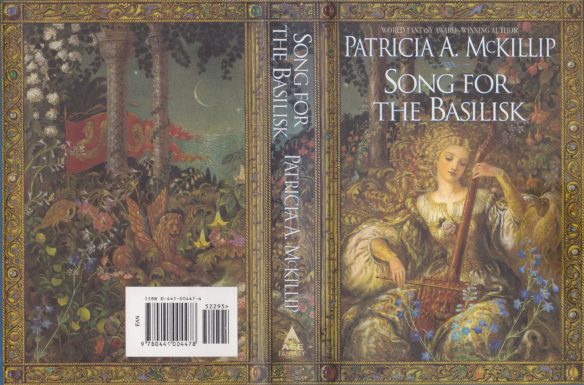“To have power over a thing, name it. To name a thing, know it. To know a thing: become it.” — “Camouflage”, Patricia McKillip
By Paul Weimer: If the world of fantasy is a series of baronies, duchies, emirates, city states, and kingdoms, and every fantasy author has a place of their own in fantasy, there is a special realm. A realm of subtle magic, and of beautiful music. Where the people are a full part of the land, a rich place where its creatrix has imbued the place with immersive detail. Where bards sing and myth and legend wind into the fabric of the land, the soul of the people who inhabit it. A land of poetry and power, always wondrous to cross the border and visit.
This is the realm of Patricia McKillip.
In the mid to late 1990’s, I started a serious campaign to really understand a genre I had already been reading for 20 years: science fiction and fantasy. I had been led by chance, choice and suggestion up into that point but in the middle of the 1990’s I decided to be more systematic in my reading of SFF. Not being connected to a wider community of science fiction, I used the tools I had on hand, and leaned on my issues of Locus to tell me what I should be reading–by looking at finalists and winners of various awards. The Hugo Award, the Nebula Award, the Locus Award, and among others, the Mythopoeic Award.
And, so among the many fine authors and their work I thus started to discover in the late 1990’s in that effort would be Patricia McKillip. It seems to be a truism for me that if I really like an author’s work, no matter how much better their subsequent work is, I bond very strongly with the first work of theirs I read. This is definitely true of McKillip. When I saw in that long ago issue of Locus that she had won the Mythopoeic Award for Song for the Basilisk, I went and dutifully picked it up at Forbidden Planet. (I was blessed, living in NYC, to have a dedicated SFF bookstore I could rely on).
The lush cover reminded me a bit of Tom Canty’s work (it is actually by Kinuko Y. Craft). The lush and richly descriptive and immersive prose reminded me some of the more poetic aspects of Tolkien, or the descriptive power of early Zelazny, or Peter S Beagle. I fell for the story of Caladrius/Rook/Griffin hard and well. For all that I love sorcerers and martial heroes, having a bard as a hero was something relatively unusual in my reading. It’s a careful and well-drawn thing, a writer who knows the power of words, the power of music, the power of language and revelation, to use a character who is raised to be all of that to point and counterpoint the very techniques that the author uses to bring the story to life. And it was a revelation to have a hero deal with the villain not by a swordfight, or a magical contest, but with the power of music. And even there, the denouement is not as straightforward or direct as you might think. It’s a high wire balancing act that charmed me into her worlds, firmly and forever.
I then subsequently started reading McKillip’s work, backwards and since, from the Celtic-themed Riddle-Master books all the way to the last work of hers I read, “Camouflage”, a story in Jonathan Strahan’s The Book of Dragons, introducing us to yet another everyday character, Will Fletcher, who is better at hiding his talents even from himself than even he knows. It is a story of hope and building and working toward a future.
I find that I have not read as much of McKillip’s short fiction as I have with her novels. However, her short stories, especially the aforementioned and most accessible “Camouflage”, I feel ARE a good way for readers who might be reluctant or nervous to immerse themselves into McKillip’s work and just want to try a taste of her down-to-earth characters, her love of language, of poetry, of evocative description, of characterization and beats of the heart that draw you to love and fall in love with her characters. In an age and time where a lot of epic fantasy is frenetic, kinetic, and dark, there is a more stately and beautiful pace that McKillip’s work evokes. It is not all light and sweetness, there can be depth and darkness in her work, but her worlds are fundamentally more optimistic, and brighter, than a large share of fantasy today.
Sadly, now, McKillip and her work have come to an end. Her influence (never her shadow, she illuminated, not overshadowed her peers) runs to fantasy today, even in this age of grimdark fantasy and gritty shades of grey. Authors like Michele Sagara, Julie Czerneda, Daniel Abraham and others carry on her tradition, extending and reinventing and exploring what McKillip first illuminated, extending the boundaries of fantasy in her vein.
I will close with a quote from early in A Song for the Basilisk that just shows the sheer power of her ferocious literary talent:
“Play the song you made for the picochet. See if you can find it on the harp.”
He tried, but the sea kept getting in the way of the song, and so did the hinterlands. He gazed at the floating hills, wondering what he would see if he walked across them, alone through unfamiliar trees, crossing the sun’s path to the top of the world. Who would he meet? In what language would they speak to him? The language the sea spoke intruded then, restless, insistent, trying to tell him something: what song he heard in the seashell, what word the rock sang, late at night under the heavy pull of the full moon. His fingers moved, trying to say what he heard, as the sea flowed like blood in and out of the hollows and caves of the rock, trying to reach its innermost heart, as if it were a string that had never been played. He came close, he felt, reaching for the lowest notes on the harp. But it was his own heart he split, and out of it came fire, engulfing the rock in the sea.
Requiescat in pace, Patricia McKillip.
[This post will also appear at Green Man Review.]
Discover more from File 770
Subscribe to get the latest posts sent to your email.



In her books, Patricia McKillip made magic feel like magic – to an extent that few – if any – other authors have matched.
Lovely tribute. Thank you.
I asked Paul to write a few words for the next edition of Green Man where we are doing a look at what we’ve reviewed of her books plus an interview we did with her, but when he turned in this lovely essay I knew it needed to be shared more widely so I offered it up to Mike who graciously said he run it.
I am so saddened to learn of her passing. Its seems only yesterday that she and Peter Beagle came to tea at Greyhaven and gave a kind of grace to the proceedings that we have seldom had in the passing years.
At least when an author passes, that author does not truly pass away, but rather leaves us works full of the inner shimmer that the flesh can only suggest.
May she now reside in a place as brightly embroidered as the visions she left us.
What a lovely tribute. The first works I read by her were the Riddlemaster of Hed books. I still remember what a wonderful adventure that was. Pure magic.
I just finished a re-read of the Riddlemaster trilogy, and several things really stand out to me:
McKillip trusts her readers to understand what’s going on. She feels no obligation to spell things out. When Morgan has moments of realization, we’re expected to realize those things along with him, and not need to be told. Now, in places, this was a complete overestimation of the capabilities of younger me, but that’s not necessarily a bad thing–it drove me to reread carefully, look for clues, and consider that every word McKillip used was deliberately chosen to give me the necessary context.
The High One’s Realm comprises kingdoms where what it means to be royalty differs from nation to nation, and, importantly, includes one kingdom where “prince” basically means “head farmer”, with all the responsibilities therein implied. During my early first read and re-reads, the idea of a king or a prince who got his hands dirty growing food and brewing beer really stood out to me among other fantasy novels. And it’s still not hugely common! When I came across a similar idea in McKinley’s Pegasus, where the protagonist princess has to choose a career path based on the premise that the royal family is responsible for serving their people (she had to write essays about solving their kingdom’s agricultural problems!), it still stood out.
A huge sadness in this recent reread was realizing I’d held out a hope that McKillip would return to that world and tell us what lay to the west of that map she drew, and now she never will. But my head-canon is that the world is much bigger than The Realm, and connects with the worlds of her other novels, and that Bone Plain and Serre and Ombria and all the rest are over there somewhere, or maybe to the east across the sea. (Exception: the world described in Kingfisher is right here in our own world, but not everyone can see it.)
A friend of mine recently tweeted that, more than “gentle” books, what she wants are books by authors she trusts to bring her through the characters’ crises without trauma and to a peaceful ending. The Riddlemaster trilogy is exactly that. And so is the rest of McKillip’s ouevre.
I just started rereading Od Magic (Does it count as rereading when I remember nothing of the book so far?). Which starts with grief and loss and sorrow and… what Nicole just said. I trust absolutely that when I get to the end we will have resolved not just the plot but the grieving.